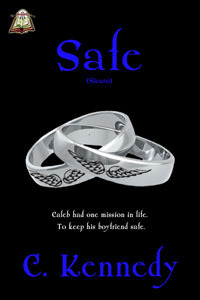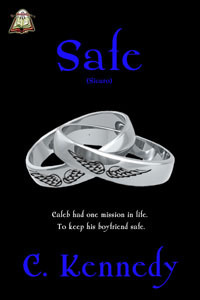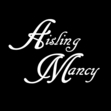Aisling Mancy's Blog, page 21
February 7, 2013
February 2, 2013
Silhouette #2
Published on February 02, 2013 15:00
January 31, 2013
January 27, 2013
A Truly Humbling Experience
Yeah, okay, I'm seriously humbled. Goodreads rankings this morning for my little novella, Safe, are:
1st out of 31 Best Gay Novels for Young Adults
1st out of 36 GLBT Books for Children and Young Adults
1st out of 69 LGBT Youth Literature
1st out of 68 LGBT Young A...dult YA Literature
2nd out of 53 Best Unknown LGBTQ Books for Teens
5th out of 36 Best LGBT YA
14th out of 197 Best Gay Romance Featuring Teenage Characters
17th out of 137 LGBT for YA
78th out of 358 Best YA Fiction with GLBTQQI themes & characters
80th out 289 Best Gay Romance - Characters Attending High School or College Check it out here!
1st out of 31 Best Gay Novels for Young Adults
1st out of 36 GLBT Books for Children and Young Adults
1st out of 69 LGBT Youth Literature
1st out of 68 LGBT Young A...dult YA Literature
2nd out of 53 Best Unknown LGBTQ Books for Teens
5th out of 36 Best LGBT YA
14th out of 197 Best Gay Romance Featuring Teenage Characters
17th out of 137 LGBT for YA
78th out of 358 Best YA Fiction with GLBTQQI themes & characters
80th out 289 Best Gay Romance - Characters Attending High School or College Check it out here!

Published on January 27, 2013 11:35
January 19, 2013
Safe by C. Kennedy Winner Announced!
 Wow! Congratulations, Tracy! A whopping big thanks to Jamie and Boys on the Brink for hosting this event and to all of you who entered to win a copy of my novella, Safe! It was great fun! Stay tuned for my upcoming novels, Omorphi and Slaying Isidore's Dragons! Visit Boys on the Brink often! It's the place to be for the best giveaways, book reviews, and author interviews in Gay Fiction!
Wow! Congratulations, Tracy! A whopping big thanks to Jamie and Boys on the Brink for hosting this event and to all of you who entered to win a copy of my novella, Safe! It was great fun! Stay tuned for my upcoming novels, Omorphi and Slaying Isidore's Dragons! Visit Boys on the Brink often! It's the place to be for the best giveaways, book reviews, and author interviews in Gay Fiction!

Published on January 19, 2013 08:24
January 16, 2013
LAST DAY to win a SIGNED copy of Safe!
 Safe breaks 100 raffle entries on the Boys on the Brink site! The most raffle entries ever for Boys on the Brink!TODAY is the LAST day to enter to win a signed copy of SAFE! It's easy!
Safe breaks 100 raffle entries on the Boys on the Brink site! The most raffle entries ever for Boys on the Brink!TODAY is the LAST day to enter to win a signed copy of SAFE! It's easy!  Enter to win right here!
Enter to win right here!
Published on January 16, 2013 09:11
January 11, 2013
Young People Should Read About Life As It Is Lived
Writing Sex in Young Adult Works
There were many important issues raised in Jesse Wave's Blog post of today and Jay Bell suggested that I weigh in with my comments. After reading the post and most of the attendant comments, I began writing my comments… hours ago. There should be a law against indiscriminate propagation of words. My comments evolved into a four-part micro-webinar. I didn’t feel it fair to post my epic tour-de-Sex in YA Lit on Jesse’s blog, nor did I feel it appropriate for my YA blog, so it’s here on my adult blog.
I have a wee mental sphere and can process only one idea at a time. As such, I separated this wieldy, polarizing controversy into four categories. I welcome comments and would appreciate it if you would add to this list if I have missed or misstated something.
Law and Age
Minors’ Rights
Popular? Opinion
Publishers and Authorship
I will preface the below comments with these disclaimers: I am not an attorney. If you have concerns, please speak with your counsel. I am not much for legal prose, this post has not had the attention of an editor, and I don’t know everything.
LAW & AGE:
Define Young Adult: I think the film industry did it best: Ages 8-12 = tween and Ages 13-17 = teen (hence the PG-13 rating). BOTH groups represent Young Adults, but are not necessarily the only groups to represent Young Adults. Some sources define Young Adults to include those a decade or more older than age 17.
Sexual Content in YA Literature: Sex is not new. Teens having sex is not new. Sexual content in YA works is not new. Authors have been writing it for years (Judy Blume, Nancy Garden, and Michael Cart. An excellent book is Michael Cart's From Romance to Realism.) What is new is the increasing number of GLBTQIA YA works (including internet shows/T.V./film) containing sexual inference and content. Sparking controversy, it begs the question: Which is at issue: The characters and nature of relationships or the sexual content?
The Age of Consent has naught to do with minors’ access to literature or material containing writings or depictions of “explicit/graphic sex,” though common sense might have us believing the two are related – or should be related. I researched “what constitutes pornography” and “what constitutes harmful to minors” before I began authoring gay YA fiction and can only speak to U.S. law.
The Age of Consent (for sexual activity) is governed by State law and ranges from the age of 14 to 18 depending on the State.
The age at which one can access literature or material containing writings or depictions of “explicit/graphic sex” is governed by Federal law and is firmly embedded in stone at age 18. States have the option of increasing the age requirement via State statute and some States have increased the age requirement to 19, 20, or 21. To wit, you will sometimes see this language added to age affirmations when entering web sites:
That you are familiar with your local community standards and that the sexually explicit text you choose to read is well within the contemporary community standards of acceptance and tolerance of your community for sexually explicit content of this nature.
The above information begs yet two additional salient questions:
a) What constitutes “explicit/graphic?” This is not clearly defined or decided by the Supreme Court, but left to interpretation via two rather dated cases and a Supreme Court Justice’s opinion: “I know it when I see it.”
b) Who constitutes a “minor?” There are an extraordinary number of inconsistencies with respect to U.S. law. You may go to war at 16 (Federal law); you may marry as young as 14 (with parental consent - State law); you may vote at 18 (Federal law); you may drink alcohol at 21 (State law – and some States used to permit drinking as young as 17 – I haven’t performed research of late); irrespective of age, Federal and State taxes must be paid if one is gainfully employed; and though a minor, one may be deemed a major for purposes of criminal prosecution. There are also reverse inconsistencies: Some States deem young people to be minors irrespective of age if they are still in high school. Though young people may marry at 14 with parental consent, some States consider them minors and they may not access literature or material containing writings or depictions of “explicit/graphic sex.” However, some States do consider them majors at the point of marriage and they may then access said content in contravention of Federal law. Go figure.
MINORS’ RIGHTS:
Protecting “Us from Us”: Our government believes that we have a duty to protect minors from themselves. They also feel the same way about majors – e.g., it is illegal to vend, purchase, carry, or consume illicit drugs. This doesn’t mean that we don’t have rights. It merely conditions them. The application of this largely undefined duty by and through inconsistent law is often applied inappropriately and to extremes. Do minors have the right to read and think for themselves? I believe they do and to disallow them to do so speaks to a lack of confidence in them.
Young Adults will Self-govern: I recently wrote this post (and several others) in the Goodreads discussion thread YA LGBT Books – Writing Sex In YA?.
“I recently had a discussion with a middle school teacher (male) who disrespectfully referred to his male students as "nothing more than a bag of walking hormones just looking for a hole." While they may be a bag of hormones, I disagreed and expressed that tweens/teens WILL self-govern. They won't read something that they are uncomfortable reading.”
In short, absent the aforementioned duty, Young Adults are much smarter and more knowledgeable than we might recognize and they will self-govern.
Sexuality Education: In the same Goodreads thread I wrote:
“Though no sexuality education exists for LGBTQIA teens, I thought it best to try to stick to what is taught in "Abstinence Plus" Sexuality Education insofar as it was realistic and adapt it to m/m events. To wit, [my] novella includes intercrural sex (taught as an alternative to intercourse). With respect to the first time oral sex, it's tastefully (cute and a little funny) described. I'm finding that many adults are unaware as to what is taught in schools. It is, plainly stated, more graphic than what I write - and includes pictures. O.o”
I admit it. It is infuriating that no Sex Ed exists for GLBTQIA teens. Jamie Deacon of Boys on the Brink recently asked me this question in an interview regarding my little gay YA novella, Safe: “This is billed as being for young adults, and some might say the content is perhaps a little too sexually explicit for the intended audience. How would you respond?” My response included this paragraph:
“Sadly, no sexuality education exists in our school systems for GLBTQ young adults. They are left to gather and process information from a range of unsanctioned and potentially unreliable sources. Writing about normal, healthy sexual exploration in teen same-sex relationships is propaedeutic in that it provides introductory information to young adults that they may not otherwise find or have access to. It also goes without saying that a young adult is always far better prepared for the outside world if armed with knowledge.”
The entire response to the question is here: Boys on the Brink: Q&A with C. Kennedy
Censorship: Please remember that, by law, parents and only parents have the right to censor what a minor reads. Teachers, coaches, librarians, etc., have no place in making that decision. Alternatively, please have empathy for school librarians. They are often faced with parents and communities demanding that a book be challenged or banned from a school library.
Minors’ Rights to Access Information: Please recall that a number of deaths occur each day around the country because GLBTQIA youths can’t access information and reach out for assistance when they need it. Though schools and libraries are required by law to allow minors to access this information via the internet, some restrict that access by programming “appropriateness” into their firewalls. By way of example, in some areas searching for GLBTQIA help results in access only to social, religious, and conversion therapy resources as opposed to emergency help and clinical/medical sites.
POPULAR? OPINION:
Context and Implicit v. Explicit: Back to that Goodreads thread. I wrote:
“[] popular opinion does sway how we write sexual content and it is important to be aware and respectful.”
The above said, I agree with many others. It is disrespectful to GLBTQIA minors to omit, soften, or alter sexual content that would otherwise be present in a heterosexual story. It is also disrespectful to minors not to address sexual content in a fashion that meets with present-day exposure, impositions, and the demands of society.
As mentioned in Jay Bell and Jesse Wave’s posts, sexual knowledge, interpretation, exploration, and activity are incredibly large parts of a hormonally challenged Young Adult’s existence and it is crucial that we write sexual content in such a way as to promote sound and responsible behavior. We certainly don’t want teens learning how to have sex from a gratuitous sex or rape scene. IMO, reading responsibly written sexual content in the context of a close friendship or romance is appropriate for Young Adults.
What I, and nearly 100% of the authors I know, won’t do is cater to prurient interest and exploit the nascent, developing minds of young adults to sell more books. In this vein, we are careful never to write gratuitous or graphic sex, and not to write sex so “explicitly” that it borders on gratuitous or graphic. So, what constitutes “explicit?” That definition is in the eye of the beholder. Puritanical isn’t my gig. Writing fades to black and wholly off screen sex when writing romance isn’t germane writing. Context, context, context.
AUTHORSHIP & PUBLISHERS
Publishing: I’ll speak to the little I know about the ever-changing and slightly psychotic publishing industry. Conventional publishers aren’t that afraid to include sexual content in YA literature particularly given that the eBook boom is impinging on their profits. Over the next few years, conventional publishers will have no alternative but to develop a dramatically different perspective if they want to remain profitable and will take various stances with respect to said content. They’ll edit the content, of course, but they’ll be more open-minded than they are today. I also expect to see a Supreme Court case over this very issue arise in the not-too-distant future.
Intended Audience: I’ll speak to the little I know about intended audience. While I am aware that adults comprise a large part of the revenue stream for YA books, I write for Young Adults. Period. I do so for ages intended to be ten to eighteen, I deal with tough issues, I want youths to learn from my books, and want them to walk away from my stories feeling good. Whether my books resonate with adults or transcend the YA marketplace, I can’t say. I can say that I receive many emails from adults complimenting my work. Sometimes it is because they have read them. Sometimes it is because they are pleased to have something to recommend to the gay teen in their lives.
Censorship: With respect to authorship, we all know that several classic works have been banned from time to time only to become mandatory reading for tweens/teens in school. As an author, I ask self: Do I want my literary works banned or challenged? I smirk at self and answer no, but am quick to qualify it. I am willing to risk having my works banned or challenged in order to write a good story. If sexual exploration and activity is integral to the story, then it will be in there. Each author must make this decision for him or herself. See: American Library Association’s website: About Banned Books
Realism: Get real people. How ignorant do we, as authors, appear when we pretend that a Young Adult’s imagination isn’t graphic? The tweens/teens who I know can set my cheeks aflame in seconds. Not to mention, sexual urges are a moment-by-moment plight for teens, particularly male teens. That traitorous dick has a mind of its own and we would be foolish to think that they don’t imagine explicit sexual content when they see or meet someone who they think is hot. In my novel Slaying Isidore’s Dragons, Declan wants to all but kill his dick upon seeing Isidore for the first time and is terrified he isn’t going to make it out of the classroom without someone seeing his wood. Read an excerpt from Slaying Isidore’s Dragons here: Slaying Isidore's Dragons
Big No-no’s: What is definitely out for Young Adults? It goes without saying that the usual exclusions apply, (rape, incest, bestiality, etc.). Toys and anything BDSM related are also unacceptable to me. I won’t write in dental dams but will write in condoms. I won’t write in fluids that may be used in lieu of lubricant, but will write in lubricant and soap. I try to follow what is taught in our “Abstinence Plus” sexuality education and adapt it to male/male relationships. I also won’t glamorize suicide – as in Romeo and Juliet; or drugs – as in Trainspotting. The bottom line: use common sense and if you’re unsure, error on the side of restraint. I'll add one final comment: Woe be unto those who place being published and profitability over morae and ethics.
Getting Boys to Read. It is no secret that girls read more and more often than boys do. Boys also learn at a different rate and in different ways than girls do. In recent changes to education policy, boys were left behind. ABDO Publishing believes they have the answer to this conundrum by publishing graphic books, meaning comic books, to educate boys. I’m a bit old school and, while they can be entertaining, I don’t believe reading onomatopoeic words teaches good reading and comprehension skills or does much to improve those skills. Pow, bang, oomph, and eeek are a little too Cro-Magnon for me. If our novels and stories inspire boys to read, then we have done a good thing.
In close, I believe young people should read about life as it is lived. Similarly, I don’t believe poetic license is a license to scribe recklessly. On a more personal note, I don’t write to be popular or sell more books. I write to give boys hope. I leave you with two of my favorite quotes:
“There are countless reasons for reading, but when you’re young and uncertain of your identity, of who you may be, one of the most compelling is the quest to discover yourself reflected in the pages of a book.” ~ Michael Cart , How Beautiful the Ordinary
“Too many adults wish to 'protect' teenagers when they should be stimulating them to read of life as it is lived.” ~ Margaret A. Edwards
Please feel free to comment below and/or visit Jesse’s insightful post and comment there. Jessewave
Oh, yeah. One more thing: My "spicy?" YA blog: Cody Kennedy.
There were many important issues raised in Jesse Wave's Blog post of today and Jay Bell suggested that I weigh in with my comments. After reading the post and most of the attendant comments, I began writing my comments… hours ago. There should be a law against indiscriminate propagation of words. My comments evolved into a four-part micro-webinar. I didn’t feel it fair to post my epic tour-de-Sex in YA Lit on Jesse’s blog, nor did I feel it appropriate for my YA blog, so it’s here on my adult blog.
I have a wee mental sphere and can process only one idea at a time. As such, I separated this wieldy, polarizing controversy into four categories. I welcome comments and would appreciate it if you would add to this list if I have missed or misstated something.
Law and Age
Minors’ Rights
Popular? Opinion
Publishers and Authorship
I will preface the below comments with these disclaimers: I am not an attorney. If you have concerns, please speak with your counsel. I am not much for legal prose, this post has not had the attention of an editor, and I don’t know everything.
LAW & AGE:
Define Young Adult: I think the film industry did it best: Ages 8-12 = tween and Ages 13-17 = teen (hence the PG-13 rating). BOTH groups represent Young Adults, but are not necessarily the only groups to represent Young Adults. Some sources define Young Adults to include those a decade or more older than age 17.
Sexual Content in YA Literature: Sex is not new. Teens having sex is not new. Sexual content in YA works is not new. Authors have been writing it for years (Judy Blume, Nancy Garden, and Michael Cart. An excellent book is Michael Cart's From Romance to Realism.) What is new is the increasing number of GLBTQIA YA works (including internet shows/T.V./film) containing sexual inference and content. Sparking controversy, it begs the question: Which is at issue: The characters and nature of relationships or the sexual content?
The Age of Consent has naught to do with minors’ access to literature or material containing writings or depictions of “explicit/graphic sex,” though common sense might have us believing the two are related – or should be related. I researched “what constitutes pornography” and “what constitutes harmful to minors” before I began authoring gay YA fiction and can only speak to U.S. law.
The Age of Consent (for sexual activity) is governed by State law and ranges from the age of 14 to 18 depending on the State.
The age at which one can access literature or material containing writings or depictions of “explicit/graphic sex” is governed by Federal law and is firmly embedded in stone at age 18. States have the option of increasing the age requirement via State statute and some States have increased the age requirement to 19, 20, or 21. To wit, you will sometimes see this language added to age affirmations when entering web sites:
That you are familiar with your local community standards and that the sexually explicit text you choose to read is well within the contemporary community standards of acceptance and tolerance of your community for sexually explicit content of this nature.
The above information begs yet two additional salient questions:
a) What constitutes “explicit/graphic?” This is not clearly defined or decided by the Supreme Court, but left to interpretation via two rather dated cases and a Supreme Court Justice’s opinion: “I know it when I see it.”
b) Who constitutes a “minor?” There are an extraordinary number of inconsistencies with respect to U.S. law. You may go to war at 16 (Federal law); you may marry as young as 14 (with parental consent - State law); you may vote at 18 (Federal law); you may drink alcohol at 21 (State law – and some States used to permit drinking as young as 17 – I haven’t performed research of late); irrespective of age, Federal and State taxes must be paid if one is gainfully employed; and though a minor, one may be deemed a major for purposes of criminal prosecution. There are also reverse inconsistencies: Some States deem young people to be minors irrespective of age if they are still in high school. Though young people may marry at 14 with parental consent, some States consider them minors and they may not access literature or material containing writings or depictions of “explicit/graphic sex.” However, some States do consider them majors at the point of marriage and they may then access said content in contravention of Federal law. Go figure.
MINORS’ RIGHTS:
Protecting “Us from Us”: Our government believes that we have a duty to protect minors from themselves. They also feel the same way about majors – e.g., it is illegal to vend, purchase, carry, or consume illicit drugs. This doesn’t mean that we don’t have rights. It merely conditions them. The application of this largely undefined duty by and through inconsistent law is often applied inappropriately and to extremes. Do minors have the right to read and think for themselves? I believe they do and to disallow them to do so speaks to a lack of confidence in them.
Young Adults will Self-govern: I recently wrote this post (and several others) in the Goodreads discussion thread YA LGBT Books – Writing Sex In YA?.
“I recently had a discussion with a middle school teacher (male) who disrespectfully referred to his male students as "nothing more than a bag of walking hormones just looking for a hole." While they may be a bag of hormones, I disagreed and expressed that tweens/teens WILL self-govern. They won't read something that they are uncomfortable reading.”
In short, absent the aforementioned duty, Young Adults are much smarter and more knowledgeable than we might recognize and they will self-govern.
Sexuality Education: In the same Goodreads thread I wrote:
“Though no sexuality education exists for LGBTQIA teens, I thought it best to try to stick to what is taught in "Abstinence Plus" Sexuality Education insofar as it was realistic and adapt it to m/m events. To wit, [my] novella includes intercrural sex (taught as an alternative to intercourse). With respect to the first time oral sex, it's tastefully (cute and a little funny) described. I'm finding that many adults are unaware as to what is taught in schools. It is, plainly stated, more graphic than what I write - and includes pictures. O.o”
I admit it. It is infuriating that no Sex Ed exists for GLBTQIA teens. Jamie Deacon of Boys on the Brink recently asked me this question in an interview regarding my little gay YA novella, Safe: “This is billed as being for young adults, and some might say the content is perhaps a little too sexually explicit for the intended audience. How would you respond?” My response included this paragraph:
“Sadly, no sexuality education exists in our school systems for GLBTQ young adults. They are left to gather and process information from a range of unsanctioned and potentially unreliable sources. Writing about normal, healthy sexual exploration in teen same-sex relationships is propaedeutic in that it provides introductory information to young adults that they may not otherwise find or have access to. It also goes without saying that a young adult is always far better prepared for the outside world if armed with knowledge.”
The entire response to the question is here: Boys on the Brink: Q&A with C. Kennedy
Censorship: Please remember that, by law, parents and only parents have the right to censor what a minor reads. Teachers, coaches, librarians, etc., have no place in making that decision. Alternatively, please have empathy for school librarians. They are often faced with parents and communities demanding that a book be challenged or banned from a school library.
Minors’ Rights to Access Information: Please recall that a number of deaths occur each day around the country because GLBTQIA youths can’t access information and reach out for assistance when they need it. Though schools and libraries are required by law to allow minors to access this information via the internet, some restrict that access by programming “appropriateness” into their firewalls. By way of example, in some areas searching for GLBTQIA help results in access only to social, religious, and conversion therapy resources as opposed to emergency help and clinical/medical sites.
POPULAR? OPINION:
Context and Implicit v. Explicit: Back to that Goodreads thread. I wrote:
“[] popular opinion does sway how we write sexual content and it is important to be aware and respectful.”
The above said, I agree with many others. It is disrespectful to GLBTQIA minors to omit, soften, or alter sexual content that would otherwise be present in a heterosexual story. It is also disrespectful to minors not to address sexual content in a fashion that meets with present-day exposure, impositions, and the demands of society.
As mentioned in Jay Bell and Jesse Wave’s posts, sexual knowledge, interpretation, exploration, and activity are incredibly large parts of a hormonally challenged Young Adult’s existence and it is crucial that we write sexual content in such a way as to promote sound and responsible behavior. We certainly don’t want teens learning how to have sex from a gratuitous sex or rape scene. IMO, reading responsibly written sexual content in the context of a close friendship or romance is appropriate for Young Adults.
What I, and nearly 100% of the authors I know, won’t do is cater to prurient interest and exploit the nascent, developing minds of young adults to sell more books. In this vein, we are careful never to write gratuitous or graphic sex, and not to write sex so “explicitly” that it borders on gratuitous or graphic. So, what constitutes “explicit?” That definition is in the eye of the beholder. Puritanical isn’t my gig. Writing fades to black and wholly off screen sex when writing romance isn’t germane writing. Context, context, context.
AUTHORSHIP & PUBLISHERS
Publishing: I’ll speak to the little I know about the ever-changing and slightly psychotic publishing industry. Conventional publishers aren’t that afraid to include sexual content in YA literature particularly given that the eBook boom is impinging on their profits. Over the next few years, conventional publishers will have no alternative but to develop a dramatically different perspective if they want to remain profitable and will take various stances with respect to said content. They’ll edit the content, of course, but they’ll be more open-minded than they are today. I also expect to see a Supreme Court case over this very issue arise in the not-too-distant future.
Intended Audience: I’ll speak to the little I know about intended audience. While I am aware that adults comprise a large part of the revenue stream for YA books, I write for Young Adults. Period. I do so for ages intended to be ten to eighteen, I deal with tough issues, I want youths to learn from my books, and want them to walk away from my stories feeling good. Whether my books resonate with adults or transcend the YA marketplace, I can’t say. I can say that I receive many emails from adults complimenting my work. Sometimes it is because they have read them. Sometimes it is because they are pleased to have something to recommend to the gay teen in their lives.
Censorship: With respect to authorship, we all know that several classic works have been banned from time to time only to become mandatory reading for tweens/teens in school. As an author, I ask self: Do I want my literary works banned or challenged? I smirk at self and answer no, but am quick to qualify it. I am willing to risk having my works banned or challenged in order to write a good story. If sexual exploration and activity is integral to the story, then it will be in there. Each author must make this decision for him or herself. See: American Library Association’s website: About Banned Books
Realism: Get real people. How ignorant do we, as authors, appear when we pretend that a Young Adult’s imagination isn’t graphic? The tweens/teens who I know can set my cheeks aflame in seconds. Not to mention, sexual urges are a moment-by-moment plight for teens, particularly male teens. That traitorous dick has a mind of its own and we would be foolish to think that they don’t imagine explicit sexual content when they see or meet someone who they think is hot. In my novel Slaying Isidore’s Dragons, Declan wants to all but kill his dick upon seeing Isidore for the first time and is terrified he isn’t going to make it out of the classroom without someone seeing his wood. Read an excerpt from Slaying Isidore’s Dragons here: Slaying Isidore's Dragons
Big No-no’s: What is definitely out for Young Adults? It goes without saying that the usual exclusions apply, (rape, incest, bestiality, etc.). Toys and anything BDSM related are also unacceptable to me. I won’t write in dental dams but will write in condoms. I won’t write in fluids that may be used in lieu of lubricant, but will write in lubricant and soap. I try to follow what is taught in our “Abstinence Plus” sexuality education and adapt it to male/male relationships. I also won’t glamorize suicide – as in Romeo and Juliet; or drugs – as in Trainspotting. The bottom line: use common sense and if you’re unsure, error on the side of restraint. I'll add one final comment: Woe be unto those who place being published and profitability over morae and ethics.
Getting Boys to Read. It is no secret that girls read more and more often than boys do. Boys also learn at a different rate and in different ways than girls do. In recent changes to education policy, boys were left behind. ABDO Publishing believes they have the answer to this conundrum by publishing graphic books, meaning comic books, to educate boys. I’m a bit old school and, while they can be entertaining, I don’t believe reading onomatopoeic words teaches good reading and comprehension skills or does much to improve those skills. Pow, bang, oomph, and eeek are a little too Cro-Magnon for me. If our novels and stories inspire boys to read, then we have done a good thing.
In close, I believe young people should read about life as it is lived. Similarly, I don’t believe poetic license is a license to scribe recklessly. On a more personal note, I don’t write to be popular or sell more books. I write to give boys hope. I leave you with two of my favorite quotes:
“There are countless reasons for reading, but when you’re young and uncertain of your identity, of who you may be, one of the most compelling is the quest to discover yourself reflected in the pages of a book.” ~ Michael Cart , How Beautiful the Ordinary
“Too many adults wish to 'protect' teenagers when they should be stimulating them to read of life as it is lived.” ~ Margaret A. Edwards
Please feel free to comment below and/or visit Jesse’s insightful post and comment there. Jessewave
Oh, yeah. One more thing: My "spicy?" YA blog: Cody Kennedy.
Published on January 11, 2013 17:29
January 8, 2013
O.o It's out! A review of the "other me"!
Boys on the Brink poses a hard question to Cody!
This is billed as being for young adults and some might say the content is perhaps a little too sexually explicit for the intended audience. How would you respond?

Check out the answer here!

Stay tuned for excerpts and information about Cody's upcoming novel, Omorphi!
This is billed as being for young adults and some might say the content is perhaps a little too sexually explicit for the intended audience. How would you respond?

Check out the answer here!

Stay tuned for excerpts and information about Cody's upcoming novel, Omorphi!
Published on January 08, 2013 21:47
January 7, 2013
Boys on the Brink reviews Safe by C. Kennedy!
Published on January 07, 2013 08:04
January 6, 2013
A chance to win a SIGNED copy of my little novella Safe!
 It's here! A chance to win a signed copy of my novella, Safe! It's easy! All you need to do is leave a comment on the Boys on the Brink Blog! 12 days left to win! Check it out! Enter here!
It's here! A chance to win a signed copy of my novella, Safe! It's easy! All you need to do is leave a comment on the Boys on the Brink Blog! 12 days left to win! Check it out! Enter here!
Published on January 06, 2013 10:12






